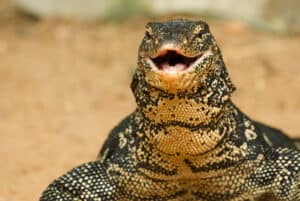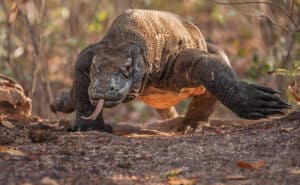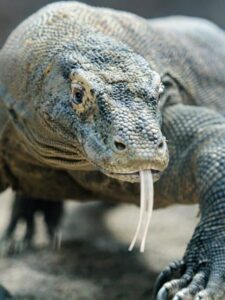
Geckos are little reptiles that are adored by many pet owners. But, how much do you actually know about this nocturnal reptile? For starters, did you know that geckos there are about 2,000 different gecko species? Geckos can be found all around the world, except Antarctica.
We’ve got the full rundown on how long geckos live and how you can help to extend the life of your pet gecko. Even if you previously considered yourself a novice on geckos, you’ll have a better understanding after reading through our quick crash course!
Quick Crash Course On Geckos
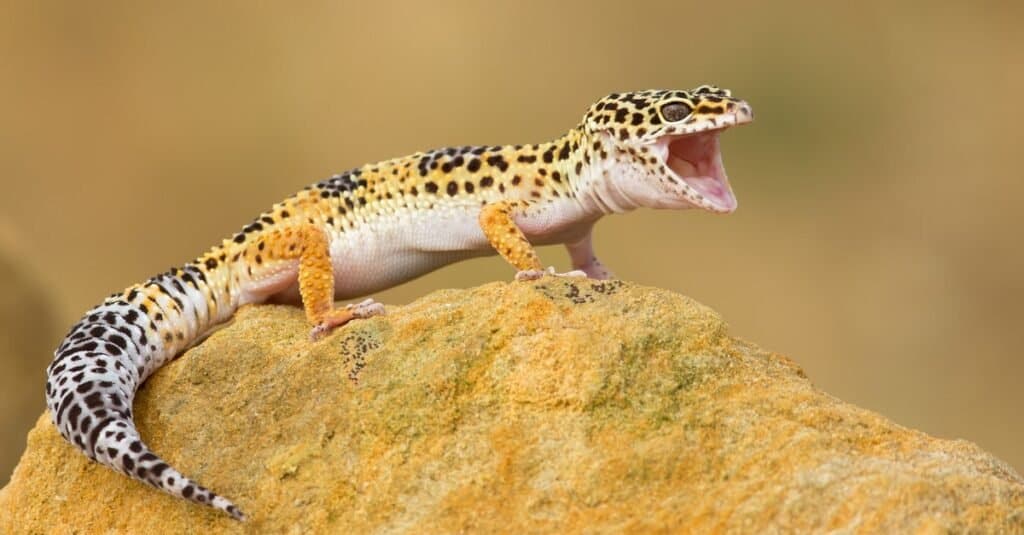
Fun fact: Most geckos do not have eyelids.
©Milan Zygmunt/Shutterstock.com
Geckos are mostly nocturnal reptiles that are a part of the suborder Gekkota. Except for Antarctica, geckos may be found practically anywhere. However, they do prefer warmer regions, such as rain forests, highlands, and deserts. To escape predators and live in the climates that they prefer, geckos have become masters at adapting to their environment. That is why you’ll find them in a range of colors, from sandy tones to vivid greens and blues that all work as camouflage.
Geckos have also inhabited the Earth for a very long time. As ancient creatures, their ancestors have been around for about 300 million years. Now that we better understand the gecko and the type of environment they prefer to live in, let’s dive even deeper. Let’s find out how long geckos live.
How Long Do Geckos Live?
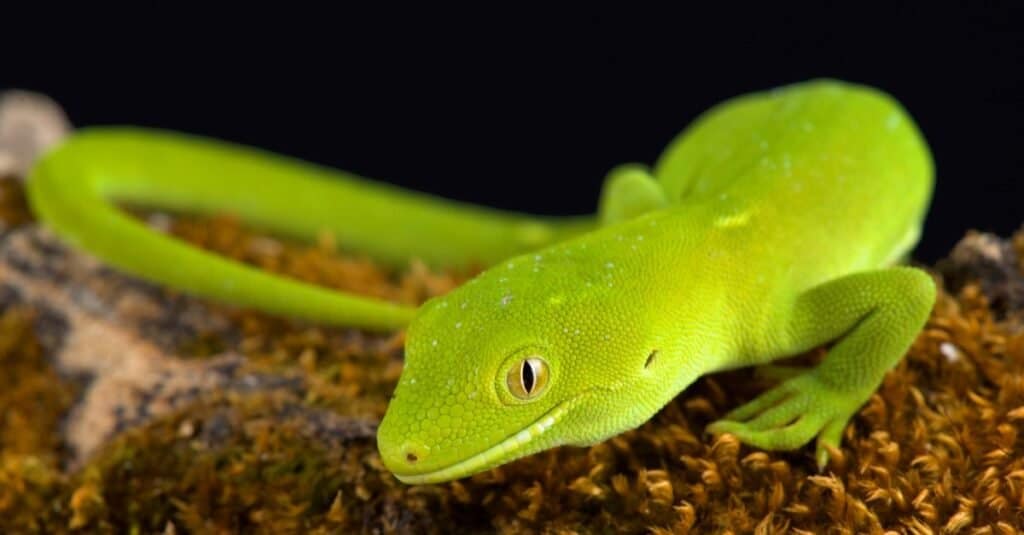
Geckos can tell the difference between different hues even when there is so little light that even humans are colorblind.
©reptiles4all/Shutterstock.com
A wild gecko’s lifespan is approximately 15 years. In captivity, these reptiles may survive for a longer period of time. For example, pet leopard geckos may survive for 15-20 years in captivity, compared to their five-year lifespan in the wild.
The survival of common geckos (Hoplodactylus maculatus) on predator-free Motunau Island in North Canterbury was published in the New Zealand Journal of Ecology. The findings from Motunau Island demonstrate that geckos can survive as long in the wild as they do in captivity, at least on a predator-free island. From 1967 to 1975, all 16 geckos captured were at least 29 years old. Ten others were thought to be at least 36 years old.
It seems that geckos are capable of long lives when they don’t have to worry about predators hunting them down. Let’s explore how geckos reproduce and become the lizards that we have grown so fond of.
The Average Gecko Life Cycle
Geckos, like other reptiles, go through three life stages. The stages are known as hatchlings, juveniles, and adults.
Hatchling/Baby
Most geckos lay a small clutch of eggs, although a handful are live-bearing and may reproduce asexually by parthenogenesis. A gecko is called a baby or hatchling until it weighs 3 grams or just less than an ounce. They typically do not feed during their first few days of life, instead, they subsist on unconsumed yolk supply. When baby geckos shed, they eat the old skin since it is good for their growth and development. They subsequently begin to hunt for bug food on a regular basis.
Juvenile
You can picture the juvenile stage of a gecko’s life as if they are teenagers. During this stage, they will begin to really grow and start working toward reaching their eventual adult size. During this fast-growing phase, juvenile geckos shed regularly. This stage is really all about focusing on growth, so the gecko will also need to be eating frequently in order to support this growth stage.
Adulthood
At around 12-18 months, a gecko grows into its adult body. When geckos are young, they shed once a week, but when they are fully grown, they shed once every one to two months. Geckos that are a year old shed their bands and develop their morphs more fully, and they become sexually mature.
How To Extend The Life Of Your Pet Gecko
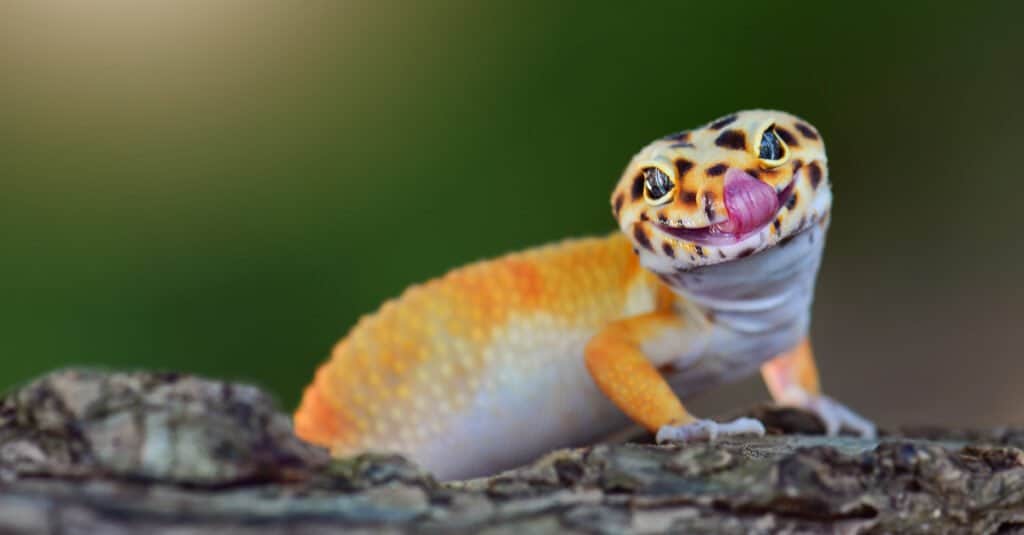
Scientists can tell if a gecko is diurnal or nocturnal by looking at its pupils. Vertical pupils are seen in nocturnal geckos, whereas circular pupils are found in diurnal geckos.
©DWI YULIANTO/Shutterstock.com
Geckos are fascinating reptiles that make excellent pets. They are pretty harmless and are an overall low-maintenance pet to keep. Leopard, crested, house, flying, and frog-eyed geckos are the most affordable species for beginners. Since they will become a part of your family, you’ll want to do everything within your power to ensure they live a long and healthy life.
Here are some tips and tricks on keeping your pet gecko healthy and extending its lifespan:
- Proper housing: You must keep your gecko in a suitable tank, aquarium, terrarium, or vivarium. There are a variety of sizes available at pet shops and online. Because the enclosure must keep the gecko warm, it must neither be too large so that heat is wasted nor too small so that the gecko becomes disoriented and cannot reach the warm areas of its tank.
- Proper diet & nutrition: Because most geckos do not consume plants or vegetables, you must be comfortable with live insects if you wish to keep a gecko. There are various bug options, and some are favored over others by distinct gecko species. These include mealworms, crickets, super worms, and waxworms. Crickets and mealworms are normally geckos’ basic foods, with super worms and waxworms as a treat.
- Handling them with care: Avoid grabbing a gecko by the tail because they frequently drop their tails (a natural defense against predators). However, there is no need to fear if this occurs. It will regrow, but in a different form and/or color. If they have lost their tail, it is best to keep them away from other animals in their tank until the tail grows back.
The photo featured at the top of this post is © iStock.com/Samantha Dunn
Thank you for reading! Have some feedback for us? Contact the AZ Animals editorial team.



